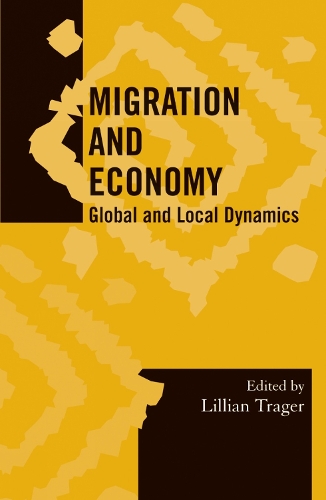
Migration and Economy: Global and Local Dynamics
(Paperback)
Publishing Details
Migration and Economy: Global and Local Dynamics
By (Author) Lillian Trager
Contributions by Ricardo Perez
Contributions by Dolores Koenig
Contributions by Jeffrey Cohen
Contributions by Meltem Sancak
Contributions by Peter Finke
Contributions by Sasha Newell
Contributions by Silvia Grigolini
Contributions by Stephen Lubkemann
Contributions by Robyn Eversole
AltaMira Press
AltaMira Press
5th October 2005
United States
Classifications
General
Non Fiction
304.8
Physical Properties
Paperback
344
Width 188mm, Height 226mm, Spine 21mm
531g
Description
Trager and her coauthors focus on migration not as a single event but as a dynamic process that responds to and is shaped by broader economic, cultural and social forces. Individual essays consider issues of international and internal migration, of transnational and multilocal networks through which remittances and other flows take place; and of migrants as active agents. They offer original studies on Mexico, Puerto Rico, West Africa, Kazakstan, and Mozambique. This new volume will be a valuable resource in development anthropology, migration studies, and international planning and policy.
Reviews
This volume is an important addition to the literature on migration. It makes a valuable claim for the contributions of anthropology to an understanding of economic dimensions of migration. Several essays also contribute to a growing literature on the meaning and impact of return migration and remittances on sending communities. Above all else the essays in this volume are clearly written and well-grounded in rich ethnographic data from a number of places around the world. -- Caroline B. Brettell, Southern Methodist University * Anthropological Quarterly *
This volume is a much-needed contribution to our understanding of migration dynamics. It is especially valuable for providing detailed case studies from across the globe that highlight how local contexts profoundly shape a given migrant process. It includes extremely well grounded ethnographic data from extremely diverse cases (Kazakhstan, Puerto Rico, African nations, Latin America), not just the countries we usually hear about in discussions of migration. In particular the strength of the articles on African cases add a completely new picture to migration studies, as this region is so often left out. Yet, reading the entire collection of articles illuminates ways to explore migration from a comparative perspective, and to find issues that echo cross-culturally without losing the insights gained from each case study. The volume is a genuinely new and different contribution with far-reaching implications for migration studies. Important themes revealed throughout the volume include 1) the negotiation processes between migrants and home communities - whether it's negotiation over material, social or symbolic systems, 2) the context-specific potential for beneficial outcomes to sending communities of migration and 3) the need to examine a variety of types o -- Lisa Cliggett, University of Kentucky
This volume is a much-needed contribution to our understanding of migration dynamics. It is especially valuable for providing detailed case studies from across the globe that highlight how local contexts profoundly shape a given migrant process. It includes extremely well grounded ethnographic data from extremely diverse cases (Kazakhstan, Puerto Rico, African nations, Latin America), not just the countries we usually hear about in discussions of migration. In particular the strength of the articles on African cases add a completely new picture to migration studies, as this region is so often left out. Yet, reading the entire collection of articles illuminates ways to explore migration from a comparative perspective, and to find issues that echo cross-culturally without losing the insights gained from each case study. The volume is a genuinely new and different contribution with far-reaching implications for migration studies. Important themes revealed throughout the volume include 1) the negotiation processes between migrants and home communities - whether it's negotiation over material, social or symbolic systems, 2) the context-specific potential for beneficial outcomes to sending communities of migration and 3) the need to examine a variety of types of mobility (internal, international, long term, short term, external incentives, internal incentives, etc) in order to better grasp this profoundly important phenomenon of our contemporary world. The volume is an excellent source for researchers and scholars on recent research on migration, and will also be extremely useful in the classroom for courses on globalization, migration, economic development, and economic anthropology. -- Lisa Cliggett, University of Kentucky
Author Bio
Lillian Trager is professor of anthropology at the University of Wisconsin, Parkside.
